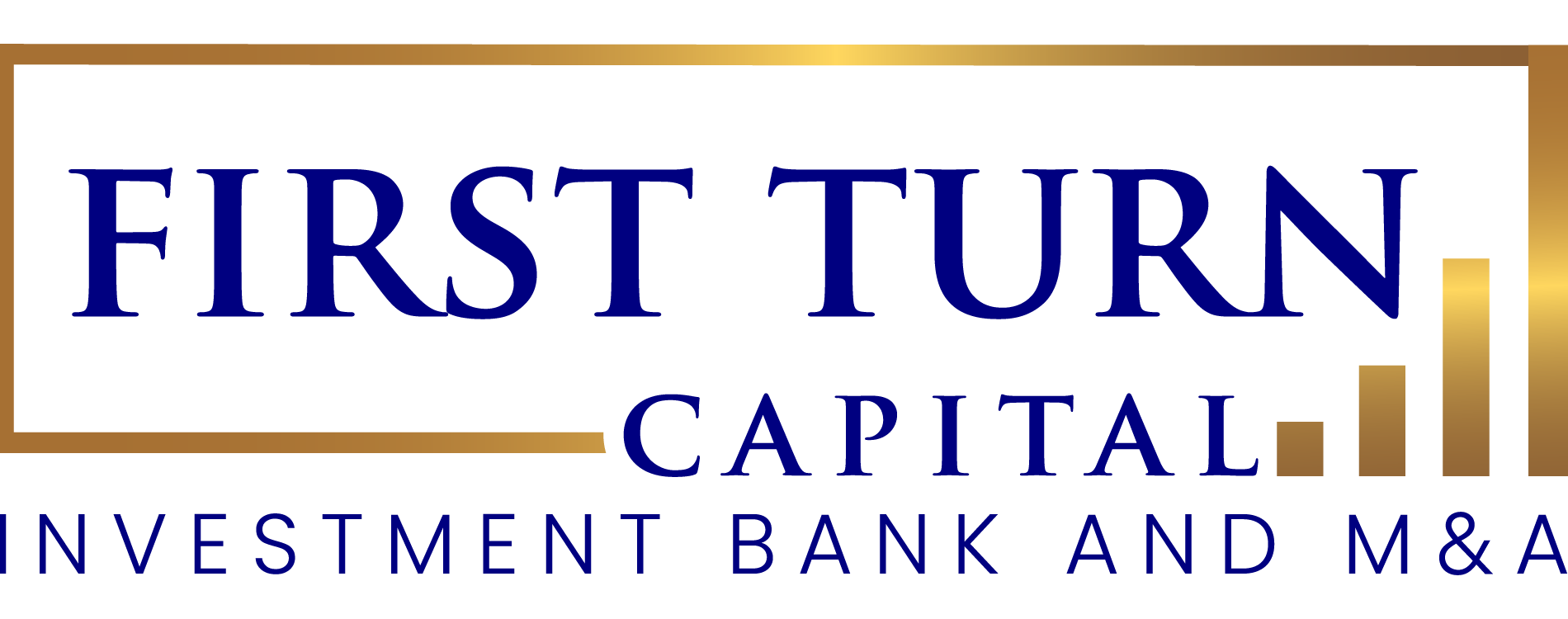You want your next move to count. Maybe you are chasing a bigger income. Maybe you want sharper skills and a faster career. Or you are curious whether the long hours are worth it when you also care about family, friends, and a life outside work. This guide speaks to that real mix of ambition and tradeoffs for readers in their mid-20s to 40s.
At First Turn Capital, we advise companies on mergers, acquisitions, and capital raises. We see how bankers create value and what the job asks of you. We will keep things beginner-friendly, translate the jargon, and stick to practical takeaways you can use.
What you will get here
- Plain-English definitions for common terms like EBITDA, multiples, and equity vs. debt
- A simple view of pay, hours, and workload by level
- The skill stack you actually build on the job
- Exit paths and realistic timelines
- A quick checklist to help you decide if the trade fits your goals
Think of this as coffee with a banker friend who tells you the truth, minus the buzzwords. By the end, you will have a clear picture of the upside, the cost, and whether investment banking matches the future you want.
Is Investment Banking Worth It? A Plain-English Starting Point

You want your next move to count. Maybe you want higher income, sharper skills, or a path that opens doors in finance without losing sight of life outside work. This guide is for readers in their mid-20s to 40s who want a beginner-friendly answer to whether investment banking is worth it. We will explain the job, translate jargon, and show how the tradeoffs stack up in real life.
At First Turn Capital (FTC), we advise companies on mergers, acquisitions, and capital raising across the United States. Our investment banking and advisory services connect companies with capital and help leaders make smart, high-stakes decisions. You will see how that work translates to skills, pay, and options.
What Investment Bankers Really Do Day to Day
Investment bankers help companies plan and execute important transactions. That means building financial models, preparing materials for investors, coordinating due diligence, and guiding negotiations so deals close on time. You will work with clients, investors, lawyers, and accountants to turn complex ideas into clear decisions.
Investment Banking Services and Advisory Services at FTC
FTC supports companies with capital raising, M&A advisory, equity capital markets, and debt capital markets, plus investor relations and restructuring. You get senior-level attention and practical advice shaped by real-deal experience.
Corporate Finance, Decoded
Corporate finance answers three questions: where to get capital, how to invest it, and how to return value to investors. In banking, you sit at the point where companies, markets, and money meet.
Investment Banking Activities Across Capital Markets and M&A
Common activities include market analysis, valuation, building a buyer or investor list, running a structured process, and helping teams communicate risks and opportunities. At FTC, those activities support private and public companies, family offices, and financial sponsors.
How Capital Markets Function
Capital markets move money from those who have it to those who can put it to work. Companies raise capital, investors seek returns, and banks match the two sides through organized processes.
Equity Markets and Equity Securities vs Fixed Income
- Equity markets involve selling ownership stakes through equity securities like common stock.
- Fixed income involves borrowing through bonds or loans with set payments.
- Both are financial instruments used to finance growth, acquisitions, or refinancing.
These two streams give companies different tradeoffs on control, cost, and flexibility.
Institutional Investors, Financial Institutions, and Private Investors
You will meet institutional investors such as pension funds and endowments, financial institutions like insurance companies and banks, and private investors including family offices. Each group assesses risk, return, and strategy in its own way, which is why clear communication and clean data matter.
Raise Capital: The Main Paths

Companies raise money through equity or debt. The goal is to fund growth, refinance obligations, or add additional capital for acquisitions without harming long-term value.
Initial Public Offering: How a Company Goes Public
An initial public offering introduces a company to the public stock market. The process includes preparing audited information, marketing to institutional accounts, pricing the shares, and listing on an exchange. The benefit is broader access to capital and liquidity. The tradeoff is more scrutiny and ongoing reporting.
Capital Raising With Private Equity Firms and Other Investors
Not every deal needs a listing. Private equity firms, infrastructure funds, and other entities provide capital for expansion, buyouts, or recapitalizations. Bankers help structure terms, align incentives, and match the right capital to the business model so value creation is the outcome, not just capital in the door.
Meet the Buy-Side: Private Equity, Hedge Funds, and Asset Management
- Private equity focuses on control or significant influence, with a multi-year plan for operational change and exit.
- Hedge funds trade liquid securities with strategies that can be directional or market-neutral.
- Asset management invests on behalf of clients across equity and fixed income to hit specific goals.Understanding these playbooks helps you advise clients and anticipate questions. That is real relationship management, not just emails and models.
Equity Research and the Stock Market
Equity research teams publish views on companies and industries. Their work informs investors and helps management teams position the story. For bankers, these insights guide messaging, valuation ranges, and risk disclosures.
The Skill Stack You Build
Banking pays in more than compensation. It gives you a toolkit you carry into private equity, corporate roles, and startups. Think of it as three pillars: turning raw numbers into clear models, running complex processes under pressure, and communicating decisions so people move. The sections below break those skills into plain English and show how they translate beyond the deal room.
Financial Modeling, Accounting, and Valuation
You will learn financial modeling, accounting shortcuts that keep you fast and accurate, and valuation tools that boards and investors understand. The outputs are comparables, DCFs, and precedent analyses that frame decisions.
Risk Management, Diligence, and Deal Execution
Great bankers are early risk management thinkers. You will map risks, test assumptions, and keep a deal on track when data changes. That discipline carries into any career path, whether you stay in banking or move to operating roles.
Relationship Management That Drives Value Creation
You are not only a numbers person. You listen, provide advice, and translate complex ideas into clear recommendations. Good relationship habits turn into repeat transactions and real value creation for corporate clients.
Investment Banking vs Commercial Banking
Both live under “banking,” but they serve different needs. Commercial banking focuses on deposits, payments, and lending. Investment banking focuses on corporate finance, capital raising, and advisory services like mergers, acquisitions, and restructurings. FTC operates on the advisory and capital side to help companies plan and execute pivotal moves.
Career Path and Exit Options in the Investment Banking Industry
Most people spend a few years building skills, then either advance inside the investment banking sector or exit to private equity, corporate development, asset management, or startups. Your time is the investment. The return is a portable skill set and a strong network.
Wall Street Names and the Wider Market

The investment banking industry includes large platforms such as JPMorgan Chase, Morgan Stanley, Bank of America, and Goldman Sachs, along with many investment banks that specialize by size, sector, or product. Boutique and middle-market firms often give you more direct client time and faster responsibility, which many readers value as they compare lifestyle and free time.
Where First Turn Capital Fits
FTC serves private companies, public companies, family offices, and financial sponsors. Our team provides investment banking services across equity capital markets, debt capital markets, and M&A advisory, with senior-level attention on every engagement. We work with organizations across the United States and guide leaders through complex, high-stakes decisions.
Quick Glossary in Layman’s Terms
- Capital markets: Places where companies and governments raise money from investors.
- Equity: Ownership in a business. Shares represent equity.
- Debt: Borrowed money that must be repaid with interest.
- IPO: First time a company sells stock to the public.
- Fixed income: Bonds and loans with scheduled payments.
- Securities: Tradable financial claims like stocks and bonds.
- DCF: A valuation that estimates what future cash flows are worth today.
This glossary is a quick reference so readers can move through the post without getting stuck on jargon.
Should You Do It? A Simple Litmus Test
- Do you like fast learning, late nights during live deals, and clear stakes where your work moves the market story forward
- Do you want direct exposure to executives and real influence on business outcomes
- Are you comfortable trading some free time for higher money potential and a strong network
If most answers are yes, investment banking may be worth the trade for your goals. If not, you can still work in finance through roles in strategy, FP&A, or other organizations that partner with banks.
How FTC Can Help You Weigh The Tradeoffs
Whether you want to raise capital, explore other securities options, or compare exit paths, we can walk you through the landscape in plain English and build a plan that fits your timeline. FTC connects corporations with the right capital, helps leaders tell a clear story to institutional investors, and keeps the process organized from first meeting to closing.
Bottom line: Is investment banking worth it?
Yes for many people in their late 20s to 40s, but only if the trade fits your goals. The work can speed up your learning, earnings, and network. It also asks for long hours and real focus outside a nine-to-five routine. Think of it like any investment. If the expected return matches your priorities, it is worth it. If not, there are better paths in finance that match your lifestyle.
It is likely worth it if you:
- Want accelerated learning and direct exposure to executives
- Value higher earning potential in exchange for some nights and weekends
- Enjoy fast problem solving, financial modeling, and clear performance feedback
- Plan to leverage the skills into private equity, corporate development, or a leadership role within a few years
A quick wrap on those points. If you nod along to most of them, the upside usually outweighs the time cost.
It may not be worth it if you:
- Prioritize predictable hours and flexible evenings
- Prefer slower, steady growth over sprints and deadlines
- Want creative autonomy outside of finance-focused roles
- Dislike client-facing work or high-stakes communication
That list does not end the conversation. It simply flags where another finance track could fit better.
Talk to First Turn Capital

If this guide helped you sort the tradeoffs and you want a verdict tailored to your goals, let’s talk. First Turn Capital advises on capital raising, M&A, equity and debt capital markets, and investor relations, and we keep the conversation in plain English.
Tell us where you are in the process and what you want to achieve. We can walk through equity versus debt, what an IPO or private placement could look like for your company, and how to get investor-grade materials in place. The discussion is confidential, focused, and built around your timeline.
Bottom line, investment banking is worth it when the return on your time and energy outruns the cost. If that is the path you want, we will help you set the plan, compare options, and move forward with clarity. Get in touch today!

